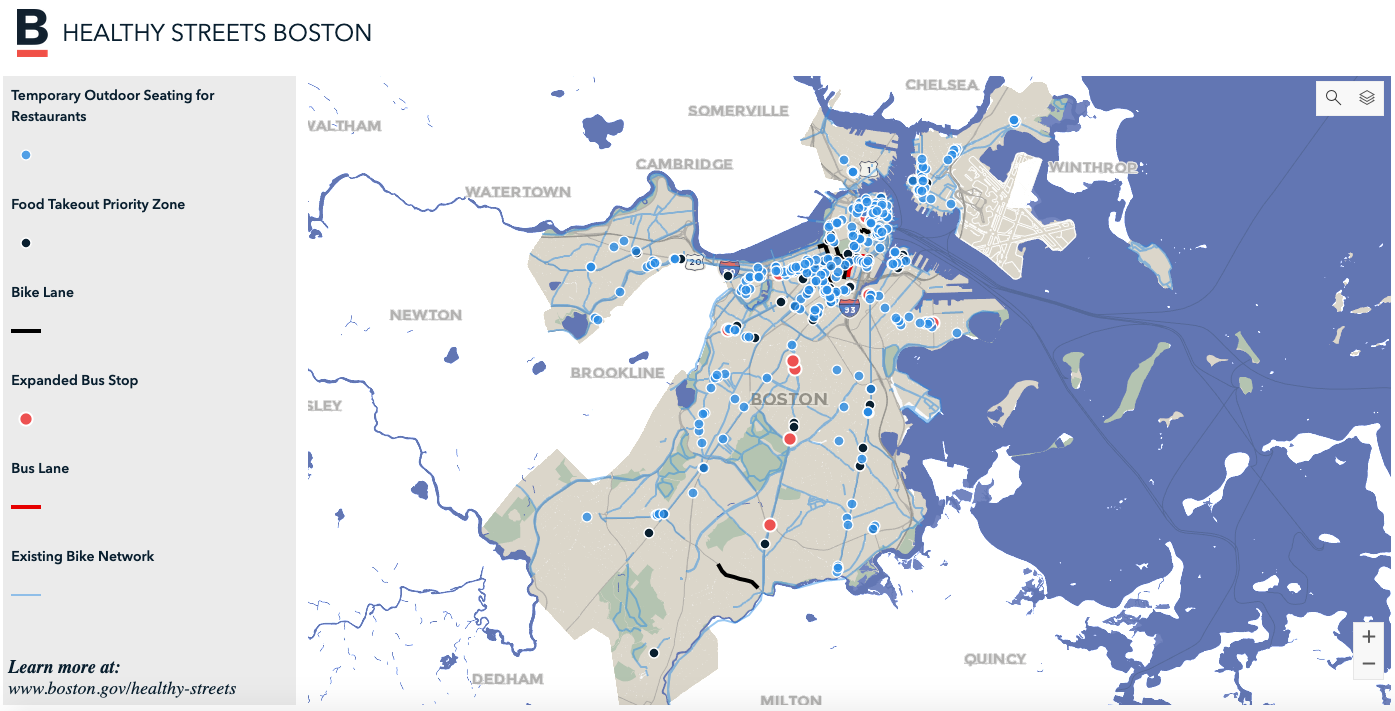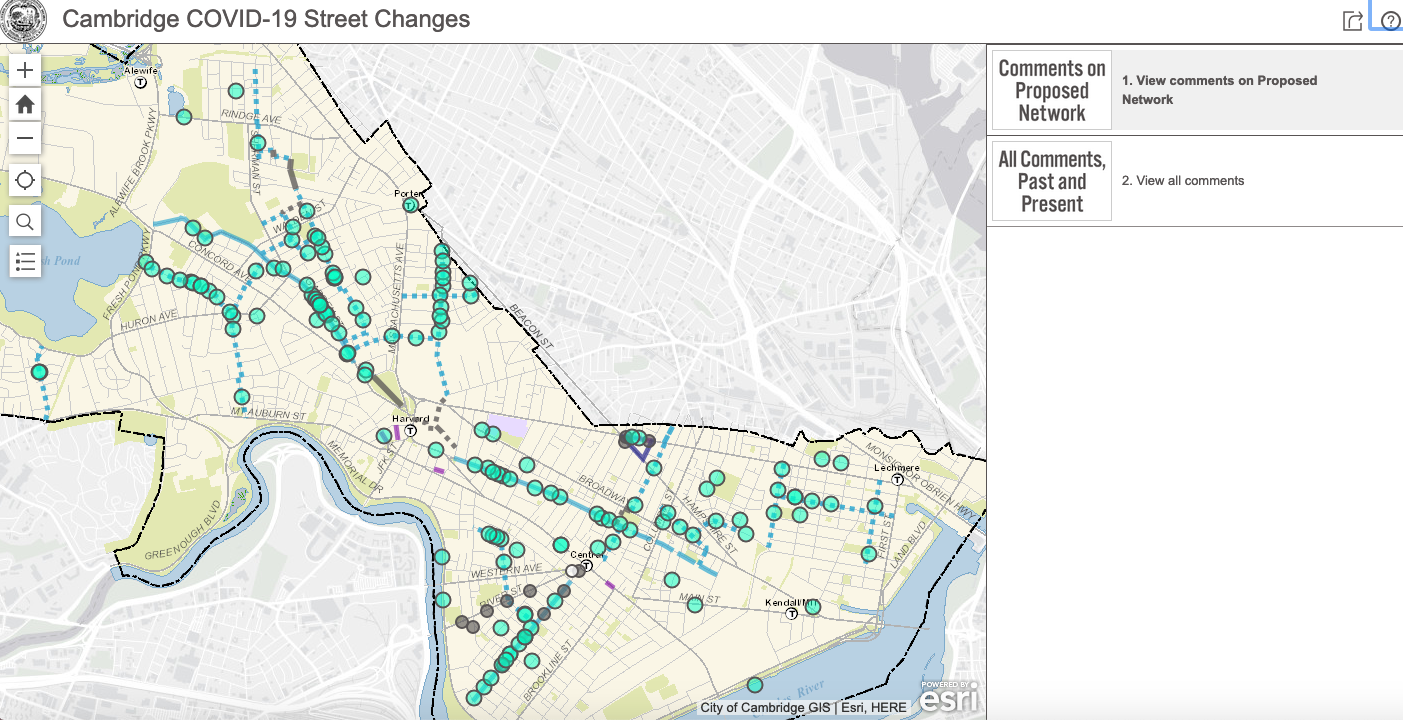COVID-19 Resources
Shared Streets
Repurposing street space to accommodate
increased walking, biking, dining, and retail
As we begin to reopen and public health guidelines continue to encourage physical distancing, how can municipalities repurpose street space to accommodate increased demand for walking, biking, and outdoor retail?
MAPC is helping our municipalities answer that question. We're eager to support our cities and towns in thinking through ways to repurpose street space to allow for safe walking and biking, more efficient bus service, and expanded outdoor dining and retail options. Here are some ways we can be of help:
- Regional visioning and planning
- Collective procurement of materials
- Coordination and sharing best practices
- Technical assistance at the local level
On this page, find resources and grant opportunities for shared streets initiatives. Please reach out with questions and project ideas!
Questions?
If you have questions or would like to work with MAPC on shared streets initiatives, reach out to MAPC Transportation Director Eric Bourassa at [email protected].
Map of Shared Streets and Spaces in the MAPC Region
Maps: Municipal COVID-19 Street Changes
Resources
Grant Opportunities
Case Studies
Case Study: Fall River–Creative Partnerships for Economic Development
Building on efforts to spur economic development in downtown Fall River through MassDevelopment’s Transformative Development Initiative (TDI), community advocates partnered with local designers and arts organizations to activate the area during the COVID-19 pandemic.
Established in 2019 through MassDevelopment’s Transformative Development Initiative, the Fall River TDI District aims to connect the city’s central business core with other neighborhoods and nodes of activity. TDI Fellow Jim McKeag, a full-time MassDevelopment employee specializing in urban and economic development, works within a crosssector TDI Partnership (with representation from the city and local businesses and nonprofits) to support
and lead community-based projects by connecting people, identifying resources, and empowering Fall River residents. When the COVID-19 pandemic struck, McKeag worked with a host of local organizations, students, small businesses, and other constituents. The team built on the existing efforts to launch a downtown outdoor dining and wayfinding program to further support the Fall River community. Read more.
Case Study: Everett–Building Community Through Creative Signage and Art
Since 2016, the City of Everett has been working on small- and large-scale projects to “Reimagine Broadway,” the city’s main thoroughfare that provides connections to local businesses and neighborhoods, as well as to downtown Boston. The cornerstone of this multi-part project has been its Bus Rapid Transit (BRT) work, including dedicated bus lanes, level boarding, and transit signal priority.
In September 2020, the City received $150,000 from MassDOT’s Shared Streets and Spaces Grant Program to implement peak-hour northbound bus lanes on approximately a half mile of Broadway and a quarter mile of Main Street to alleviate delays for bus passengers. The City, in collaboration with MassDOT, the Massachusetts Bay Transportation Authority (MBTA), the Institute for Transportation and Development Policy (ITDP), and local community partners wanted to improve service reliability and mitigate crowding conditions quickly in response to the COVID-19 pandemic, and prioritizing the bus was one way to do that. Read more.
Case Study: Melrose's People-Powered Parklets
When the Massachusetts Department of Transportation (MassDOT) announced the first round of funding for the Shared Streets and Spaces Program in June 2020, Jonah Chiarenza and Ryan Williams, officers in the volunteer-led Melrose Pedestrian and Bicyclist Committee (Ped/Bike Committee) took note. They realized that the grant offered an exciting opportunity to kickstart the expansion of shared spaces and safer streets and reached out to the City to pursue the idea.
Thankfully, the City was already on board and poised to pursue the Shared Streets and Spaces grant opportunity: adding parklets was part of the City’s 2017 Master Plan, and City staff were exploring opportunities to create more outdoor gathering spaces amid the COVID-19 pandemic. The City had also heard from many members of the community expressing interest in more seating downtown and in other business districts, specifically in the form of parklets, through an extensive community outreach campaign associated with the recently launched Wayfinding & Creative Placemaking Initiative. Read more.
In June 2021, Melrose made the city's full set of parklet plans available to the public. Learn more here.
Case Study: Amesbury Outdoor Dining and Retail
The City of Amesbury (pop: ~17K) proactively sought to address the challenges of their small businesses due to on-site capacity restrictions implemented by the Commonwealth to protect public health during the COVID-19 pandemic. With most downtown restaurants operating from older brick buildings without outdoor space, the City looked to municipally-owned property to safely serve patrons outside.
Case Study: Arlington Shared Streets Pilot
A residential shared streets project piloted by the City of Arlington between April 27 and June 1, 2020. The Brooks Avenue Shared Streets pilot was initiated to slow speeds and provide additional space for physical distance on Arlington streets.
Case Study: Chelsea Community Art During COVID-19
This project aimed to rapidly adapt the City of Chelsea’s public art programming to create a safe and accessible means for public expression and processing the community’s trauma during the COVID-19 pandemic, while nurturing and networking local artists.
Photo LIbrary
Looking for photo examples of quick-build shared streets and spaces projects in the region? This Flickr photo library includes photos from dozens of projects; many of which are free to use with attribution!
Interested in contributing? Contact Jessica Boulanger at [email protected].
Design & Procurement Resources
Melrose's parklets consist of a “modular” 7-foot by 7-foot wooden design, accommodating both planter boxes and art panels for the engagement of the local art community. They can be installed in pieces, to create a parklet that is as small or as large as local context allows — and they are constructed with readily available materials, meaning that small modifications can easily be handled. The City made the plans available to the public here.
Tactical Public Realm Case Studies [A Better City]
This report highlights the planning, design, and implementation process for three tactical public realm projects managed by A Better City, in addition to a fourth case study describing several pop-up plazas implemented by the City of Boston.
Age-Friendly Winter Spaces: Ideas for Municipalities to Embrace Winter
This guide for cities and towns can help create a project that helps people of all ages maintain an ability to exercise, access community assets, and get outside safely.
Guide to statewide contracts that can be used to facilitate shared streets equipment purchases.
List of vendors that offer materials for shared streets and spaces programs. The listed vendors may or may not be under a Massachusetts Statewide Contract administered by the Operational Services Division. Neither the Metropolitan Area Planning Council nor the Massachusetts Department of Transportation endorse any vendor. This list is provided as a convenience and it is not represented to be a complete of all vendors that provide the materials.
Webinars
Shared Streets and Spaces: Progress and Planning Ahead
January 5, 2022 at 10 a.m.
In January 2022, MassDOT released a new round of the Shared Streets and Spaces Grant Program with a focus on transit and roadway safety. Applications will be accepted until March 1.
In this webinar, learn more about the newest funding round and hear about "Quick and Creative Street Projects: Measuring the Impact in Massachusetts." The new Barr Foundation report provides examples and data from 23 municipalities that experimented with innovative, low-cost street projects over the course of 2020 and 2021.
Webinar Resources:
- Webinar recording
- MassDOT Presentation: Shared Streets and Spaces Grant Program
- Shared Streets and Spaces Grant Program website
- Presentation: Quick and Creative Street Projects
- Quick and Creative Street Projects: Measuring the Impact in Massachusetts. The new Barr Foundation report provides examples and data from 23 municipalities that experimented with innovative, low-cost street projects over the course of 2020 and 2021.
Shared Streets Peer Exchange Panel: Looking Back, Looking Forward
In 2020, cities and towns throughout Massachusetts re-imagined their public spaces, converting streets and sidewalks into spaces that would promote active transportation, social distancing, outdoor dining, multimodal transit, and safe exercise.
On January 12, 2021, in partnership with MassDOT and the Solomon Foundation, the Metropolitan Area Planning Council hosted a panel discussion and Q&A on Shared Streets. Municipal representatives reflected on the complex projects they undertook, shared lessons learned, and looked forward to what's next.
Panelists included:
- Kate Fichter (moderator), Assistant Secretary for Policy Coordination, MassDOT
- Wayne Feiden, FAICP, Director Planning & Sustainability, Northampton
- Katrina O’Leary, Town Planner, Middleton
- Police Chief Tom Galvin, Berlin
- Ben Cares, Senior Planner and Project Manager, Chelsea
Webinar: Shared Winter Streets and Spaces Grant Program
MAPC held a webinar on Tuesday, November 24 on how cities and towns can apply for the MassDOT Winter Shared Streets and Spaces grant program. Missed it? You can still watch the recording!
- Shared Winter Streets and Spaces program overview
- State Contract Guide
- Vendor Guide
- Shared Streets Photo Library
- Edmonton's Winter Design Guidelines
- Bench Consulting's Winter Places Design Guide
- Winter Places Webinars:
- Part I: Inspire, with Guillermo Penalosa of 8 80 Cities
- Part II: Implement, with Jonathan Berk of Bench Consulting/Patronicity
-
Ensuring an Equitable Approach to Rebalancing Streets – Toole Design – February 2021: https://tooledesign.com/wp-content/uploads/2021/02/Ensuring-an-Equitable-Approach-to-Rebalancing-Streets.pdf
Shared Streets and Spaces: Navigating MassDOT's New Grant Program
MAPC held a webinar on Tuesday, June 30 on how cities and towns can apply for the new MassDOT Shared Streets and Spaces grant program. Missed it? You can still watch the recording!
- For questions about the MassDOT grant program, email [email protected]
- For questions about technical assistance opportunities, please contact one of the providers listed on MassDOT's website or reach out to Lisa Jacobson at [email protected].
- For questions about purchasing materials off OSD's statewide contracts,
please contact Danielle Frizzi, Director of Marketing, Communications, and Events, at [email protected].
Resources:
- Presentations:
- State Contract Materials:
Webinar:
Sharing Our Streets
MAPC held a webinar on Thursday, June 4 on how municipalities can create more space for walking, biking, and outdoor retail. Missed it? You can watch the recording below.
Our speakers included:
- Eric Bourassa, MAPC Director of Transportation
- Brad Rawson, City of Somerville Director of Mobility
- Kate Fichter, MassDOT Assistant Secretary for Policy Coordination
- David Loutzenheiser, MAPC Senior Transportation Planner



